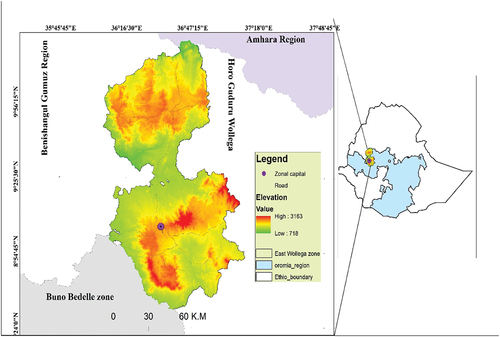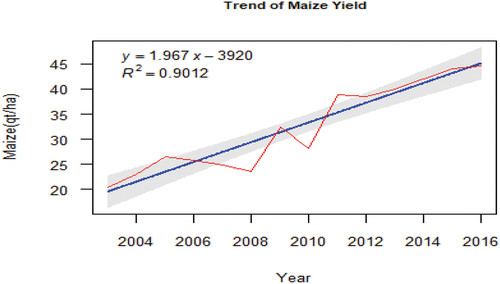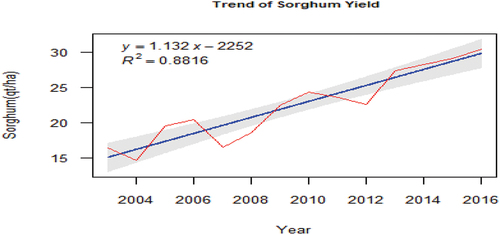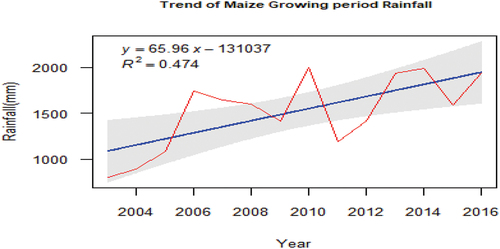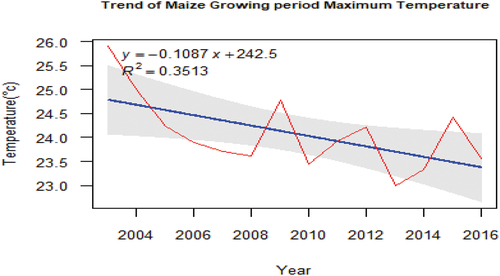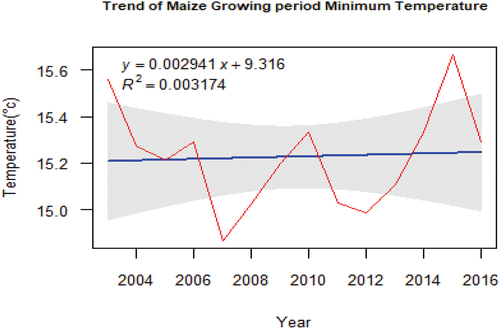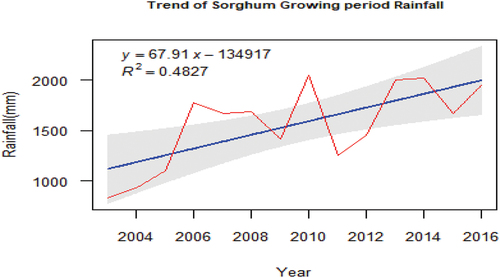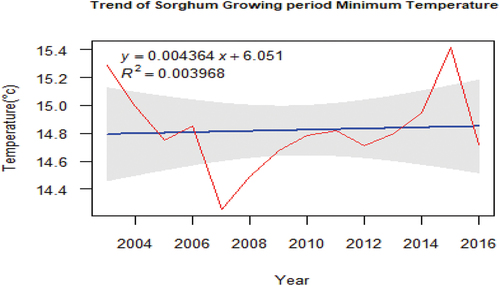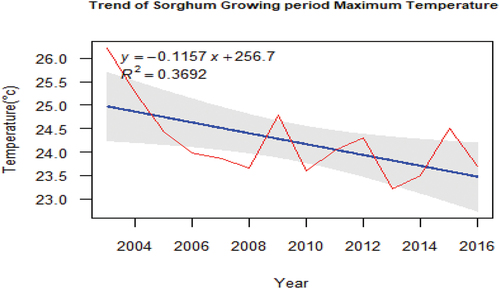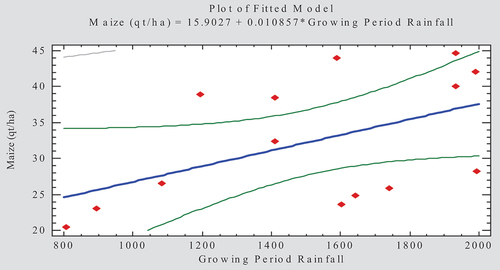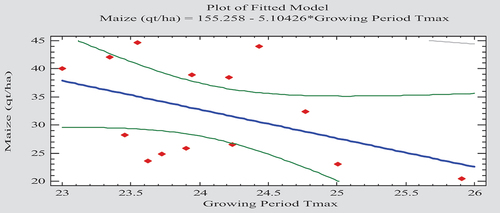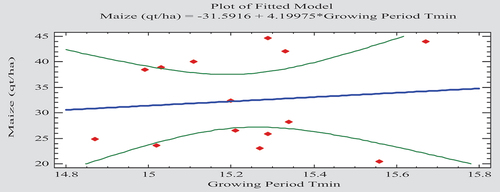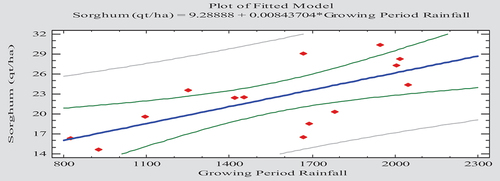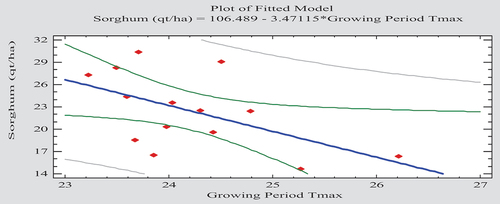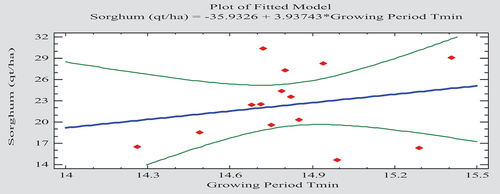Abstract
Rain-fed food crop production is very sensitive to climate variability. The majority of Ethiopian population is reliant on rain-fed seasonal agriculture, which is the backbone of the country’s economy. The objective of the study was to investigate the impact of rainfall and temperature changes on maize and sorghum yields. The data were analyzed using the Mann–Kendall trend test, Sen’s slope, correlation, and regression models. The study’s findings demonstrated that rainfall and temperature have different effects on maize and sorghum yields. The Mann-Kendall trend test has detected the presence of a significant increasing trend for both maize and sorghum yields. Though there was an upward trend, the result also suggests that maize and sorghum yields have been fluctuating more. There was a variation of 90% and 88% in maize and sorghum yield, respectively. The R-squared statistics indicated the variability of 25.21%, 1.12%, and 20.39% in maize yield was explained by its growing period rainfall, minimum, and maximum temperature respectively. Growing period rainfall and minimum temperature were positively correlated with maize and sorghum yield output, while the maximum temperature was negatively correlated. A significant association has been detected between sorghum yield and its growing period rainfall and maximum temperature. The regression model revealed that rainfall, minimum, and maximum temperatures explained 46.81%, 5.08%, and 30.18% of the variation in sorghum production, respectively. Both crops showed unpredictability as a result of rainfall and temperature changes, emphasizing the necessity for irrigated agriculture, agricultural diversification, and livelihood diversification to respond to climate variability.
Public Interest Statement
Climate change is a major source of concern across our planet’s environmental, social, and economic sectors. The majority of the Ethiopian population is reliant on rain-fed seasonal agriculture, which is the backbone of the country’s economy. The production of rain-fed food crops is extremely vulnerable to climate variability. Farmers can make adjustments to their farming activities and plan for adaptation ahead of time if they have access to scientifically informed data on the influence of climate on food crops. As a result, knowing the impact of climate variability on crop yield is critical for ensuring food security for Ethiopia’s rapidly growing population in the face of a changing climate.
1. Introduction
Global food crop production has already been impacted by climate change and variability (Ray et al., Citation2020). Despite decades of efforts to enhance food security, hunger and its physical repercussions continue to be a chronic problem in resource-poor economies around the world (Ballard et al., Citation2011). In Africa, where rain-fed agriculture is critical for daily survival and adaptive capacity is low, climate change has a higher impact (Cudjoe et al., Citation2021). Agriculture is always at risk for a variety of reasons, the most significant of which are climate risks, which are both unavoidable and unanticipated (Neenu et al., Citation2013). Climate variability has a significant impact on rain-fed subsistence crop output (Olayide et al., Citation2016). Rainfall and temperature are key climate variables that influence crop growth, development, and yield (Yu et al., Citation2014). The effects of climate variability on agriculture are very complex and diverse (Siebert and Ewert, Citation2014). It has direct and indirect effects on the agriculture sector, affecting crop yields, which in turn affect food supply (Herrero et al., Citation2010). Its direct effect on agricultural systems includes variations in precipitation and temperatures, which could impact agro-climatic conditions, altering growing seasons, planting and harvesting calendars, water availability, pest, weed, and disease populations (Saul, Citation2015). Reduced crop output owing to drought and floods, as well as reduced water availability, are all negative effects of climatic variability in food crop production (Levira, Citation2009). Decreasing rainfall and increasing temperatures are affecting crop production in rain-fed agriculture, resulting in aggravating food insecurity (Dube & Phiri, Citation2013).
Climate variability and extreme events such as floods, droughts, heat and cold waves, heavy rainstorm affected crop production (Rasul et al., Citation2002). Rainfall uncertainty remains a serious problem threatening smallholder farmers (Ndamani and Watanabe, Citation2015). Unpredictable rainfall has a detrimental effect on food crop agriculture (Mar et al., Citation2018). It also affects soil nutrients through erosion, which in turn affects crop yield under rain-fed small-scale agriculture (Zike, Citation2019). The net potential effect of severe changes in rainfall pattern is the disruption in crop production leading to food insecurity, joblessness, poverty, and population displacement (Kyei-Mensah et al., Citation2019). According to a study that looked at the impact of rainfall variability on food security in 71 developing nations from 1960 to 2016, it lowers food security in emerging countries (Kinda et al., Citation2019). High temperatures cause an array of morphological, anatomical, physiological, and biochemical changes in plants, which affect crop production (Shen et al., Citation2017). It affects crop development, metabolism and productivity (Hasanuzzaman et al., Citation2013). Low temperature during the growing period decrease germination and impede vegetative growth by including metabolic imbalances and can delay or prevent reproductive development (Andrews, Citation1987). Under optimum temperature for germination and development can cause physiological loss in maize (Miedema, Citation1982).
Ethiopia is highly susceptible to the effect of climate variability with wide gap studies at local level (Degife et al., Citation2021). Subsistence rain-fed crop production is the basis of the economy on which livelihood is fully dependent. The agricultural sector is dominated by smallholder farmers who are primarily reliant on rain-fed farming with conventional technology with minimal input and low production (Deressa and Hassan, Citation2009). Crop agriculture is vulnerable to the effect of weather change which disrupts food availability (Adinew and Gebresilasie, Citation2019). Smallholder farmers and their livelihoods in Ethiopia are directly affected by crop sensitivity to rainfall and temperature variability (Ketema & Negeso, Citation2020). The effort of attaining food security for the rapidly growing population is challenging because of the effect of climate variability on agriculture (Solomon et al., Citation2021). Consequently crop agriculture in Ethiopia faced severe and complex problems (Seyoum et al., Citation2011). This has posed a serious threat to sustainable crop agriculture. As a result, the future of food security is in doubt due to the increased demands that will arise as the country’s population grows.
Poor rural communities are the hardest hit by climate change, and locally relevant research output is critical for livelihood adaptation planning (Kirono et al., Citation2016). Climate change and variability research is needed to quantify local impacts and vulnerabilities, identify adaptation options, and guide national and subnational climate policies and initiatives (Georgis, Citation2015). However, there was no local research on the impact of climate variability on maize and sorghum yields in the study area. Research on the impact of climate variability on food crops in Ethiopia is restricted at the national level, and almost non-existent at the local level. For research outcomes to be utilized, climate change research must be locally relevant. Therefore, this study intended to fill this gap by investigating the local impacts of rainfall and temperature change on maize and sorghum productivity in East Wollega Zone, Western Ethiopia. The study’s overall goal is to contribute to sustainable food crop production despite the negative effects of climate variability. The more specific objective of the study was: 1) to examine the impact of rainfall and temperature fluctuation on smallholder farmers’ rain-fed maize and sorghum productivity. 2) to determine the relationships between climate factors (rainfall and temperature) and crop yields (maize and sorghum).
2. Materials and methods
2.1. Description of the study area
The study was conducted in the East Wollega Zone, Western Ethiopia. The Zone has 17 districts and 289 rural peasant associations and is found at a distance of 328 km west of Addis Ababa. The total land of the zone is about 14,102.5 km2 which accounts for about 3.88% of Oromia (EWZPEDO, Citation2017). The Zone is found on Northing 8°31ʹ20”N to 10°22ʹ30”N and Easting 36°06ʹ00”E 37°12ʹ00”E. It is bordered by Amhara Region in the North, Jimma zone in the South, Horo Guduru Wollega and West Shewa zone in the East, Benishangul Gumuz Region in the North—West, West Wollega zone in the West, and Buno Bedelle zone in the South West (EWZPEDO, Citation2017). Figure depicts a map of the research area.
2.2. Topography and climate
The altitude of the zone ranges between 718 and 3163 meters above sea level. It is mainly of low plateau with some isolated ranges such as in Jimma Arjo district. The climate of the zone is divided into three categories, namely highland 20.50%, midland 50.90% and lowland 28.60%. The average annual temperature is between 14 °C and 25 °C and total annual rainfall is between 1000 mm to 2400 mm (EWZPEDO, Citation2017). Maximum rainfall is received from June to August. The climatic condition alternates with long summer rainfall (June to September), short rain season (March to April) and winter dry seasons (December to February). The minimum and maximum annual rainfall and daily temperature ranges from 1450 to 2150 mm and 15 to 27°C, respectively (Asamenew and Mezene, 2015). The major rainy season is during the months of June to September, which is the case for many Ethiopian highlands (Fita, Citation2014).
2.3. Soils
Soil is an essential component of agriculture and one of the most important variables influencing crop output and quality. There are different types of soils in the zone. Acrisols, cambisols, nitosols, vertisols, rendizenas, phaeozems, and cambic aerosols are just a few examples. Dystric Nitosols can be found practically everywhere throughout the zone (EWZPEDO, Citation2017). The main agricultural production constraints were soil erosion, soil fertility reduction, waterlogging, soil acidity, and termites (Degefa et al., Citation2020). Soil erosion, heavy tillage, agricultural nutrient exhaustion, and deforestation are the main drivers of soil degradation and nutrient depletion (Erkossa & Ayele, Citation2003).
The soils of the studied area have been severely eroded as a result of environmentally unfriendly farming methods and high rainfall levels, resulting in nutrient loss, soil acidity, and overall land and natural resource degradation. As a result, most soil acidity-sensitive crops such as barley, bean, and wheat have been forced out of cultivation in the region (Achalu, Citation2014). Climate is one of the most significant elements influencing soil formation, having significant implications for soil development, usage, and management in terms of soil structure, stability, topsoil water-holding capacity, nutrient availability, and erosion (Karmakar et al., Citation2016). According to Fayiga and Saha (Citation2017) soil organic matter has been identified as the most important factor that affects the productivity of the soil and determines crop yields. However, extreme heat can cause a decline in soil productivity by increasing soil organic matter decomposition and decreasing soil available water.
2.4. Socio-economic conditions
2.4.1. Population
According to East Wollega Zone Planning and Economic Development Office (EWZPEDO, Citation2017) East Wollega zone’s total population was 1,628,569 out of which 824,195 (50.61%) were males whereas about 804,374 (49.39%) were females. During this year about 81.12% of the total populations were rural, who are directly engaged in agriculture. During the year 2017 there were 175,173 males and 20,405 females totally 195,578 households in peasant associations of the zone. The crude population density of the zone in the year 2017 was 115.034 person per. km2 (EWZPEDO, Citation2017). Rapid human growth in the study area has resulted in a significant shift in land use, with the majority of natural forest destroyed for cereal cultivation and local fuel (Achalu, Citation2014).
2.4.2. Farming system
The study area’s farming system is classified as mixed farming (Degefa et al., Citation2020). The dominant source of livelihoods in the study area is crop production and livestock rearing. Crop and livestock production are used both for household consumption and as sources of cash income. The main cereal crops grown in the area include maize, sorghum, teff, millet, wheat and barley. Crop production is an important livelihood activity for farmers and is mainly rain-fed agriculture. The climatic condition of the zone is suitable for different types of crops. Among the major crops: cereal, pulses and oil seeds are produced largely throughout the zone. In the year 2017 the cultivated land was 315,752 hectares and 11,733,199 quintals of cereals was produced in the Zone. Some of the major factors that determine the potentiality of the land are temperature, length of growing period, moisture availability, flood hazard, soil degradation, toxicity and rooting condition (EWZPEDO, Citation2017). The rearing system of cattle depends on natural grass and crop residues that kept in traditional management system (Dereje et al., Citation2014). The major problems hindering agricultural productivities in the zone are land degradation, erosion, uneven distribution of rainfall, small size land holding and fragmentation, traditional agricultural activities and lack of access roads to local or central markets. Furthermore, poor and insufficient irrigation schemes, low emphasis to market system and poor infrastructure, and lack of credit facilities as well as lack of technical support are some of the constraining factors that adversely affect agricultural productivity (EWZPEDO, Citation2017).
2.5. Research design
2.5.1. Data type and sources
The study used only secondary data. Historical data for climate (temperature and rainfall) and crop yield (maize and sorghum) for 14 years (2003–2016) were collected from the National Meteorology Agency (NMA) and Central Statistical Agency (CSA) of Ethiopia respectively. Arjo, Getema, Gida Ayana, Ifabia, Nekemte, Sibu Sire, and Uke were the seven stations in the zone studied that supplied daily rainfall and temperature data.
2.5.2. Variables of the study
Both dependent and independent (explanatory) factors are included in the study. Climate variables (rainfall and temperature) were considered as independent variables. To estimate the climate response, crop yields (maize and sorghum) were employed as the dependent variable.
2.5.3. Data quality control
Quality and completeness of data determine the result of data analysis. The missing data for rainfall and temperature were filled using an interpolation approach.
2.5.4. Analytical methods
The trend of climate and crops (maize and sorghum) were analyzed using Mann–Kendall trend test and Sen’s Slope Estimator. The trend of climate variables was analyzed on a seasonal basis and the growing period of maize and sorghum. Crop-specific growing period climate variables for the periods of 2003–2016 were employed. Rather than only depend on annual averages or total for the climatic variable, the study considered an effective total growing seasonal and growing period rainfall, average growing seasonal maximum and minimum temperatures within the growing period for each crop. Climatic and crop data were also analyzed using correlation and regression analyses to establish relationships. The coefficient of variation was used to analyze rainfall, temperature, maize, and sorghum variability over time.
3. Result and discussion
3.1. Summary statistics of crop yield
Summary yield statistics for maize and sorghum are shown in Table .With a standard deviation of 8.67, the minimum, maximum, and mean maize yields were 20.42, 44.65, and 32.36 quintals per hectare, respectively. A similar study in Ethiopia’s southwest revealed similar results; the average maize yield per hectare was 33.72 quintal (Eticha, Citation2020). The minimum, maximum, and mean of sorghum yield production were 14.65, 30.39, and 22.43 quintal per hectare, respectively, with a standard deviation of 5.04. In comparison to sorghum, maize had a strong incremental trend. There was a variation of 26.78% and 22.49% for maize and sorghum yield, respectively. The average productivity of maize was 32.36, 27.50, and 26.31 quintal per hectare for the study area, regional and national, respectively, during 2003–2016. For sorghum, the average productivity was 22.43, 20.45, and 19.18 quintals per hectare for the study area, regional and national respectively. Sorghum productivity in Ethiopia averaged 21 quintals or 2.1 tons per hectare (Kinfe & Tesfaye, Citation2018). The average productivity and variation of maize and sorghum in the study area were greater than the regional and national averages.
Table 1. Summary statistics of crop yield at zonal, regional, and national level
3.2. Summary statistics of climate variables
Table presents descriptive statistics of climate variables. There was a variation of 26.44%, 26.26%, 25.03%, and 23.42% for maize growing period rainfall, sorghum growing period rainfall, yearly rainfall, and summer rainfall respectively. Maize growing period rainfall ranges from 805.97 mm to 1993.47 mm while it varied from 826.38 to 2049.92 for sorghum. The growing period maximum temperature for maize ranges from 23°C to 25.91°C while minimum temperature varied from 14.87°C to 15.67°C. For sorghum the growing period of maximum temperature varied from 23.22°C to 26.22°C while minimum temperature varied from 14.26°C to 15.41°C. The optimum maize growth temperature is 28–30°C (Cofas, Citation2018). Based on this the optimum maize growth temperature was below the optimum value which possibly affect its productivity. Low temperature can decrease plant enzyme activity and disrupts plant nutrient intake and can cause various types of physiological damage in maize (Miedema, Citation1982). Even though the water requirements of maize vary depending on the agro-ecological zones, it performs optimally in regions that receive an annual rainfall of 600–1000 mm (Durodola & Mourad, Citation2020). Based on this, annual rainfall, which varied from 940.65 mm to 2327.22 mm, was much greater than the optimum value. Too much rainfall highly declines maize yield through direct physical damage, delayed planting and harvesting, deplete oxygen and nutrient loss from the soil (Li et al., Citation2019).
Table 2. Statistical summary of climate variables
3.3. Trend of maize and sorghum yield
As indicated in Table the two-sided Mann–Kendall test was used to determine whether a statistically significant monotonic upward or downward trend exists in maize and sorghum yield. As the calculated P-value is less than 0.05, the presence of a significant upward trend has been detected at the 5% significance level for both maize and sorghum. The S statistics, Z statistics and Kendall’s tau indicate positive values, which show an increasing trend for both maize and sorghum yield. A comparable study in Ethiopia found that, the trend of maize and sorghum production grew from 1993 to 2019 (Workneh, Citation2021). The Sen’s slope of trend line also shows an increased magnitude in maize and sorghum yield by 1.934 quintals per hectare per year and 1.065 quintals per hectare per year, respectively.
Table 3. Trend of maize and sorghum yield using Mann-Kendall’s Trend and Sen’s Slope
3.4. Trend of maize and sorghum yield using regression model
Figures show an increasing trend of maize and sorghum yield, where the linear regression equation shows a positive slope value of 1.967 and 1.132 and the coefficient of determination (R2) value as explained by the linear regression model indicated a 90% and 88% of the variability in maize and sorghum yield, respectively.
3.5. The trend of maize growing period climate variables using regression model
Figures show the trend of maize growing period climate variables. The trend of maize-growing period rainfall shows an increasing trend as indicated by the linear regression equation of positive slope value of 65.96 and the coefficient of determination (R2) value explained a 47% of the variability in maize growing period rainfall. The trend of maize-growing period minimum and maximum temperatures indicated an upward and downward as showed by the linear regression equation slope value of 0.002941 and −0.1087, respectively, and the coefficient of determination (R2) value as explained by the model indicated a 35% of the variability in maize-growing period maximum temperature.
3.6. Trend of sorghum growing period climate variables using regression model
Figures below show the trend of sorghum growing period climate variables. The trend of sorghum growing period rainfall shows an increasing trend as indicated by the linear regression equation positive slope value of 67.91 and the coefficient of determination (R2) value indicated a 48% of the variability in in sorghum growing period rainfall. The trend of sorghum growing period minimum and maximum temperature indicated an increasing and decreasing trend as shown by the linear regression equation slope value of 0.004364 and −0.1157, respectively, and the coefficient of determination (R2) value as explained by the model indicated a 36% of the variability in sorghum growing period maximum temperature.
3.7. Correlation and regression of maize versus its growing period rainfall and temperature
Table shows the outputs of the fitted linear model to label the correlation between maize and growing period rainfall and temperature. As the P-value is greater than 0.05, there was no statistically significant relationship between maize and its growing period rainfall, minimum, and maximum temperature at the 95% or higher confidence level. The R-Squared statistic explains 25.21%, 1.12%, and 20.39% of the variability in maize was as a result of growing period rainfall, minimum, and maximum temperatures, respectively. Rainfall and temperature had a combined influence of 46.72% on maize yield. In contrast, the results showed that the model could not explain 53.28% of the variation in maize, implying that other factors besides rainfall and temperatures may be utilized to explain the variation in maize. A study conducted in Tanzania indicated that rainfall and temperature throughout the growing season had a 65.4% impact on maize production (Batho et al., Citation2019). The correlation coefficient of 0.5021 and −0.4515 indicated a moderately strong positive and negative relationship between maize and its growing period rainfall and maximum temperature respectively, while the correlation coefficient of 0.1059 indicated a relatively weak positive relationship between maize and its growing period minimum temperature. According to the correlation coefficients, rainfall, and minimum temperature during the growing season had a favorable impact on maize yields. Rainfall had a moderate-to-high positive connection (0.54–0.79) with grain maize yield in a similar study conducted in the Czech Republic (Maitah et al., Citation2021). below show relationship between maize and growing period rainfall and temperature.
Table 4. Correlation and regression between climatic variables and maize yield
3.8. Correlation and regression of sorghum versus its growing period climate variables
The outcome of the fitted linear model to characterize correlation and regression between sorghum and growing period climate variables is shown in Table . As P-value is less than 0.05, a statistically significant relationship was found between sorghum and its growing period of rainfall and maximum temperature at the 95% confidence level while the relationship between sorghum and its growing period minimum temperature was insignificant at a 95% confidence level. The R-Squared statistic revealed that rainfall, minimum and maximum temperatures were responsible for 46.81%, 5.08%, and 30.18% of the variability in sorghum, respectively. The overall effect of rainfall and temperature on sorghum yield was 82.07%. The model, on the other hand, was unable to explain 17.93% of the variation in sorghum, showing that other factors besides rainfall and temperatures may be used to explain sorghum variation. Climate variables (rainfall and temperature) accounted about 25% and 32% of the variability in maize and sorghum yields, respectively, according to a study done in northern Ghana (Baffour-Ata et al., Citation2021). The correlation coefficient of 0.684209 and −0.549357 indicated a moderately strong positive and negative relationship between sorghum and its growing period rainfall and maximum temperature, respectively, whereas the correlation coefficient of 0.225439 indicated a relatively weak positive relationship between sorghum and its growing period minimum temperature. In Botswana, a comparable study found a 0.53 correlation coefficient between sorghum yield and seasonal rainfall (Tsheko et al., Citation2015). Figures demonstrate the relationship between Sorghum and climate variables during the growing season.
Table 5. Correlation and regression between climatic variables and sorghum yield
4. Conclusion
Climate variability has different implications on maize and sorghum yields, according to the study. The average productivity and coefficient of variation for maize and sorghum in the study area were greater than at the regional and national levels. For both maize and sorghum yields, the Mann-Kendall trend test revealed the presence of a significant increasing trend at the 5% significance level. There was a significant upward and downward trend in maize and sorghum growing period rainfall and maximum temperature, respectively, while there was a non-significant increasing trend in minimum temperature. The coefficient of determination (R2) result suggested that maize and sorghum yields had 90% and 88% variability, respectively. Rainfall and minimum temperature during the growing season were both favorably connected with maize and sorghum yield, whereas maximum temperature was adversely correlated. The study’s findings showed that maize and sorghum productivity varied over time as a result of climate variability, implying the necessity for adaptation to climate variability. This implies the need for adjustments such as the use of irrigation, agricultural and livelihood diversification. Despite the fact that the climate system is complicated and has many variables, the current study only considers rainfall and temperature. As a result, future research should take into account more climate parameters for more in-depth investigations in the area.
Disclosure statement
No potential conflict of interest was reported by the author(s).
Additional information
Funding
Notes on contributors

Teka Bekuma Abdisa
Teka Bekuma Abdisa, Department of Natural Resources Management, Jimma University, Jimma, Ethiopia, the corresponding author, is a lecturer and researcher at Wollega University. Completed his Bachelor of Education (BEd) in Geography and Environmental Studies from Haramaya University, and completed his Masters of Education (MEd) in Geography and Environmental Education from Addis Ababa University. Currently a PhD student at Jimma University, working on Impacts of Climate Variability on Maize and Sorghum Productivity and Smallholder Farmers Adaptation Responses in the East Wollega Zone of Western Ethiopia for his PhD thesis.
Girma Mamo Diga
Dr. Girma Mamo, the second author, is a Senior Agro-meteorologist who works as a researcher and climate scientist in the Ethiopian Institute of Agricultural Research's Climate and Geospatial Biometrics Directorate.
Alemayehu Regassa Tolessa
Dr. Alemayehu Regassa, the third author, is an Associate Professor at Jimma University who works as a researcher and postgraduate program coordinator in the department of Natural Resources Management.
References
- Achalu, C. (2014). Assessment of the severity of acid saturations on soils collected from cultivated lands of East Wollega Zone, Ethiopia. Star Journal, 3(4), 42–16 http://dx.doi.org/10.4314/star.v3i4.6.
- Adinew, M., & Gebresilasie, G. (2019). Effect of Climate Change on Agricultural Output Growth in Ethiopia : Co-Integration and Vector Error Correction Model Analysis. Budapest International Research in Exact Sciences, 1(4), 132–143.
- Andrews, C. J. (1987). Low-Temperature Stress in Field and Forage Crop Production _ An Overview. Can. J. Plant Sci, 67, 1121–1133
- Baffour-Ata, F., Antwi-Agyei, P., Nkiaka, E., Dougill, A. J., Anning, A. K., & Kwakye, S. O. (2021). Effect of climate variability on yields of selected staple food crops in northern Ghana. Journal of Agriculture and Food Research, 6, 100205. https://doi.org/10.1016/j.jafr.2021.100205
- Ballard, T., Coates, J., Swindale, A., & Deitchler, M. 2011. Household hunger scale: Indicator definition and measurement guide. Food and Nutrition Technical Assistance II Project, FHI 360. August.
- Batho, P., Shaban, N., & Mwakaje, A. (2019). Impacts of rainfall and temperature variation on maize (Zea mays L .) yields : A case study of Mbeya Region, Tanzania. Archives of Agriculture and Environmental Science, 4(2), 177–184. https://doi.org/10.26832/24566632.2019.040208
- Cofas, E. (2018). The dynamics of maize production in the climate factors variability conditions, In: Agrarian economy and rural development - Realities and PERSPECTIVES for Romania. 9th edition of the international symposium, November 2018, Bucharest, The Research Institu.
- Cudjoe, G. P., Antwi-Agyei, P., & Gyampoh, B. A. (2021). The effect of climate variability on maize production in the ejura-sekyedumase municipality, Ghana. Climate, 9(10), 145. https://doi.org/10.3390/cli9100145
- Degefa, K., Biru, G., & Abebe, G. (2020). Farming system characterization and analysis of East Wollega Zone, Oromia, Ethiopia. International Journal of Management and Fuzzy Systems, 6(2), 14–28. https://doi.org/10.11648/j.ijmfs.20200602.11
- Degife, A. W., Zabel, F., & Mauser, W. (2021). Climate change impacts on potential maize yields in Gambella Region, Ethiopia. Regional Environmental Change, 21(2 https://doi.org/10.1007/s10113-021-01773-3).
- Dereje, A., Tadesse, B., & Dejene, N. (2014). Prevalence of bovinetrypanosomiasis and associated risk factors in East Wollega Zone, Western Ethiopia. European Journal of Biological Sciences, 6(2), 1–8. https://doi.org/10.5829/idosi.ejbs.2014.6.02.85108
- Deressa, T. T., & Hassan, R. M. (2009). Economic impact of climate change on crop production in ethiopia: Evidence from cross-section measures. Journal of African Economies, 18(4), 529–554 https://doi.org/10.1093/jae/ejp002.
- Dube, T., & Phiri, K. (2013). Rural livelihoods under stress : The impact of climate change on livelihoods in South Western Zimbabwe. American International Journal of Contemporary Research, 3(5), 11–25.
- Durodola, O. S., & Mourad, K. A. (2020). Modelling maize yield and water requirements under different climate change scenarios. Climate, 8(11), 1–26. https://doi.org/10.3390/cli8110127
- Erkossa, T., & Ayele, G. (2003). Indigenous knowledge and practices for soil and water management in East Wollega, Ethiopia. Conference on International Agricultural Research for Development, 310 (Germany: Stuttgart), 1–15.
- Eticha, B. (2020). Contributing factors of maize production using multiple linear regressions in mizan-aman district, bench-shako zone, Southwest of Ethiopia. Open Journal of Plant Science, 5(1), 040–045. https://doi.org/10.17352/ojps.000023
- EWZPEDO. (2017). East wollega zone planning and economic development office: Physical and socio-economic profile of East Wollega Zone.
- Fayiga, A., & Saha, U. (2017). Effect of climate change on soil productivity in developing countries. Asian Journal of Environment & Ecology, 4(1), 1–22. https://doi.org/10.9734/AJEE/2017/35485
- Fita, T. (2014). White mango scale, aulacaspis tubercularis, distribution and severity status in East and West Wollega Zones, Western Ethiopia. Star Journal, 3(3), 1–10 http://dx.doi.org/10.4314/star.v3i3.1.
- Georgis, K. (2015). Planning national adaptation responses to climate change. Climate Change Agriculture and Food Security.
- H, M., G, R., & R, S. (2009). Coping with a changing climate : Considerations for adaptation and mitigation in agriculture. Fao, 120. http://www.fao.org/docrep/012/i1315e/i1315e.pdf
- Hasanuzzaman, M., Nahar, K., Alam, M. M., Roychowdhury, R., & Fujita, M. (2013). Physiological, biochemical, and molecular mechanisms of heat stress tolerance in plants. International Journal of Molecular Sciences, 14(5), 9643–9684. https://doi.org/10.3390/ijms14059643
- Mario Herrero, Claudia Ringler, Jeannette van de Steeg, Philip Thornton, Tingju Zhu, Elizabeth Bryan, Abisalom Omolo, Jawoo Koo, A. N. (2010). Climate Variability and Climate Change : Impacts on Kenyan Agriculture. International Food Policy Research Institute.
- Karmakar, R., Das, I., Dutta, D., & Rakshit, A. (2016). Review article potential effects of climate change on soil properties : A Review. Science International, 4(2), 51–73. https://doi.org/10.17311/sciintl.2016.51.73
- Ketema, A. M., & Negeso, K. D. (2020). Effect of climate change on agricultural output in Ethiopia. Jurnal Perspektif Pembiayaan Dan Pembangunan Daerah, 8(3), 195–208. https://doi.org/10.22437/ppd.v8i3.9076
- Kinda, S. R., Badolo, F., & Tajani, F. (2019). Does rainfall variability matter for food security in developing countries ? Cogent Economics and Finance, 7(1), 1640098. https://doi.org/10.1080/23322039.2019.1640098
- Kinfe, H., & Tesfaye, A. (2018). Yield performance and adoption of released sorghum varieties in Ethiopia. Edelweiss Applied Science and Technology, 2(1), 46–55. https://doi.org/10.33805/2576.8484.115
- Kirono, D. G. C., Butler, J. R. A., McGregor, J. L., Ripaldi, A., Katzfey, J., & Nguyen, K. (2016). Historical and future seasonal rainfall variability in Nusa Tenggara Barat Province, Indonesia: Implications for the agriculture and water sectors. Climate Risk Management, 12, 45–58 https://doi.org/10.1016/j.crm.2015.12.002.
- Kyei-Mensah, C., Kyerematen, R., & Adu-Acheampong, S. (2019). Impact of Rainfall Variability on Crop Production within the Worobong Ecological Area of Fanteakwa District, Ghana. Advances in Agriculture, 1–7 https://doi.org/10.1155/2019/7930127.
- Levira, P. W. (2009). Climate change impact in agriculture sector in Tanzania and its mitigation measure. Earth and Environmental Science, 6(37), 372049 https://doi.org/10.1088/1755-1307/6/7/372049.
- Li, Y., Guan, K., Schnitkey, G. D., DeLucia, E., & Peng, B. (2019). Excessive rainfall leads to maize yield loss of a comparable magnitude to extreme drought in the United States. Global Change Biology, 25(7), 2325–2337. https://doi.org/10.1111/gcb.14628
- Maitah, M., Malec, K., & Maitah, K. (2021). Influence of precipitation and temperature on maize production in the Czech Republic from 2002 to 2019. Scientific Reports, 1–11. https://doi.org/10.1038/s41598-021-89962-2
- Mar, S., Nomura, H., Takahashi, Y., Ogata, K., & Yabe, M. (2018). Impact of erratic rainfall from climate change on pulse production efficiency in Lower Myanmar. Sustainability, 10(2), 1–16 https://doi.org/10.3390/su10020402.
- Miedema, P. (1982). The effects of low temperature on zea mays. Advances in Agronomy, 35, 93–128. https://doi.org/10.1016/S0065-2113(08)60322-3
- Ndamani, F., & Watanabe, T. (2015). Influences of rainfall on crop production and suggestions for adaptation. International Journal of Agricultural Sciences, 5(1), 2167–2447.
- Neenu, S., Biswas, A. K., & Subba Rao, A. (2013). Impact of climatic factors on crop production - A review. Agricultural Reviews, 34(2), 97–106.
- Olayide, O. E., Tetteh, I. K., & Popoola, L. (2016). Differential impacts of rainfall and irrigation on agricultural production in Nigeria: Any lessons for climate-smart agriculture? Agricultural Water Management, 178, 30–36. https://doi.org/10.1016/j.agwat.2016.08.034
- Rasul, G., Chaudhry, Q. Z., Mahmood, A., & Hyder, K. W. (2002). Effect of temperature rise on crop growth & productivity. Pakistan Journal of Meteorology, 8(15), 53–62.
- Ray, D. K., West, P. C., Clark, M., Gerber, J. S., Prishchepov, A. V., & Snigdhansu, C. (2020). Climate change has likely already affected global food production. PLoS ONE, 14(5), 1–861. https://doi.org/10.1007/978-981-15-2172-0
- Saul, E. (2015). Impact of climate change on agriculture and food security in Nigeria : challenges and adaptation. Global Advanced Research Journal of Medicinal Plant (GARJMP), 3(1), 1–9.
- Seyoum, A., Dorosh, P., & Gemessa, S. A. (2011). Crop production in Ethiopia: Regional patterns and trends. Development Strategy and Governance Division, International Food Policy Research Institute, Ethiopia Strategy Support Program II, Ethiopia, 53–83. https://doi.org/10.9783/9780812208610.53
- Shen, H. F., Zhao, B., Xu, J. J., Liang, W., Huang, W. M., & Li, H. H. (2017). Effects of heat stress on changes in physiology and anatomy in two cultivars of Rhododendron. South African Journal of Botany, 112, 338–345. https://doi.org/10.1016/j.sajb.2017.06.018
- Siebert, S., & Ewert, F. (2014). Future crop production threatened by extreme heat. Environmental Research Letters, 9(4). https://doi.org/10.1088/1748-9326/9/4/041001
- Solomon, R., Simane, B., & Zaitchik, B. F. (2021). The impact of climate change on agriculture production in ethiopia : Application of a dynamic computable general equilibrium model. American Journal of Climate Change, 10(1), 32–50. https://doi.org/10.4236/ajcc.2021.101003
- Tsheko, R., Tapela, M., Mashungwa, G., & Kayombo, B. (2015). Sorghum yield and associated satellite-derived meteorological parameters in semi-arid Botswana. African Crop Science Journal, 23(2), 151–164.
- Workneh, B. (2021). Analysis of production, yield and cultivation area trends in major cereal crops in Ethiopia. Agriculture, Forestry and Fisheries, 10(4), 123. https://doi.org/10.11648/j.aff.20211004.11
- Yu, Q., Li, L., Luo, Q., Eamus, D., Xu, S., Chen, C., Wang, E., Liu, J., & Nielsen, D. C. (2014). Year patterns of climate impact on wheat yields. International Journal of Climatology, 34(2), 518–528. https://doi.org/10.1002/joc.3704
- Zike, T. (2019). Review on the Effect of Moisture or Rain Fall on Crop Production. Civil and Environmental Research, 11(2 https://doi.org/10.7176/cer/11-2-01).

